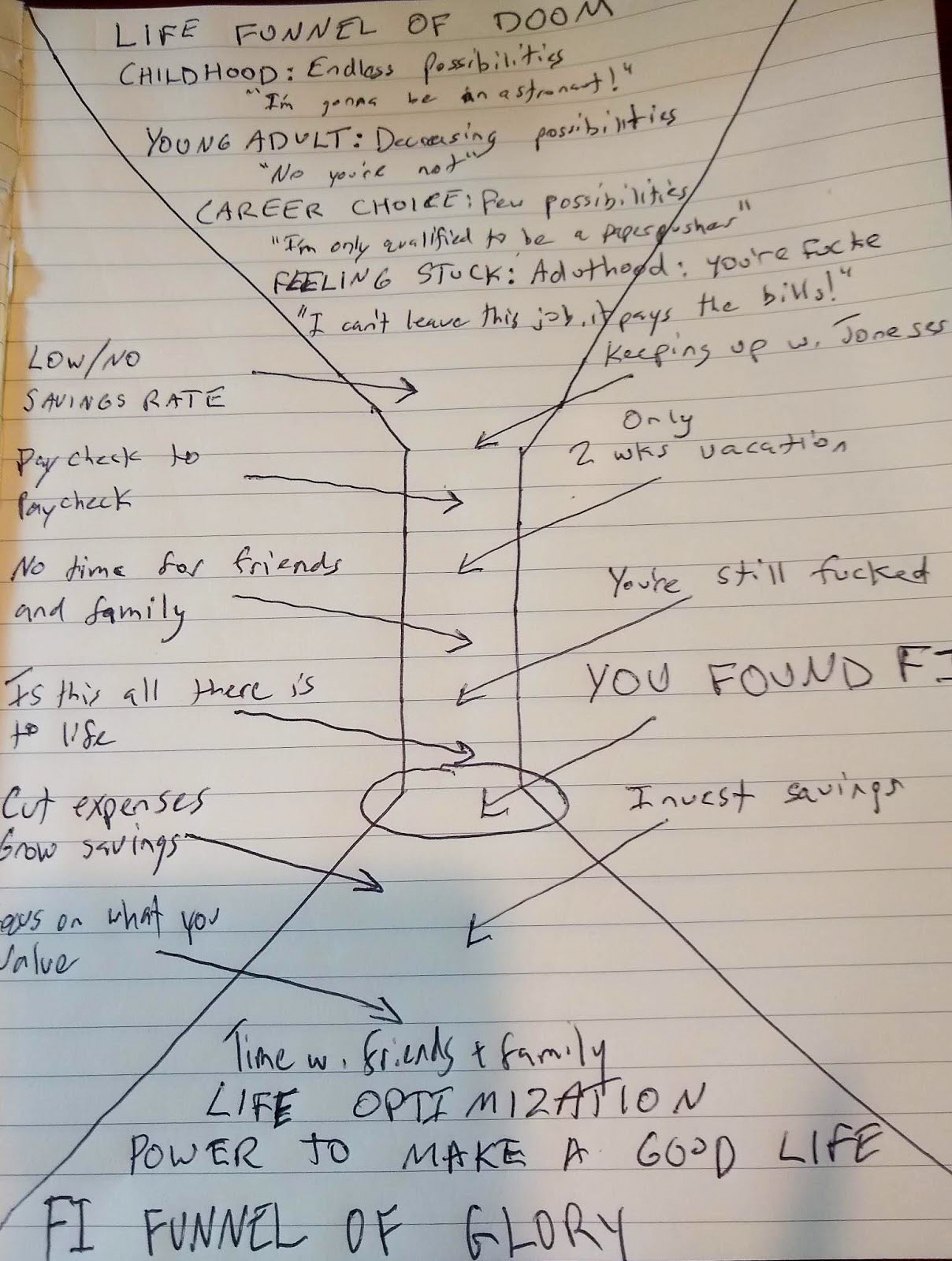Can Sport Psychology Help Us Reach Financial Independence?
“The lessons you learn on the field will help you in life!” Let’s test this hypothesis and see if sport psychology can help us reach FI.
A classic lesson you learn in sport is how to overcome adversity. Adversity is a significant feature of life, so it’s best to have a plan for when it strikes. During my athletic career I had the pleasure of working with a sports psychologist for several years so I’ve gotten pretty well acquainted with some good methods for overcoming adversity in sport.
For each step of the plan I’ll use a sport specific example and a FI specific example to see how well it applies.
Below is a table with a quick look at what we will cover in greater detail in this post!
| Sport Example 1 | FI Example 1 | Sport Example 2 | FI Example 2 | |
| Scenario | Poor early season performance | Realization of poor financial decisions | On brink of failure in pressure situation | Trouble landing a job |
| Step 1: Accept feelings | Embarrassment, frustration | Hopelessness, confusion | Terror, mortification | Low self worth, dejection |
| Step 2: Put expiration date on feelings | 5-10 minutes | 24 hours | 5 seconds | 12-24 hours |
| Step 3: Learn from mistakes | Assess performance, consult coaches | Reflect on choices, determine how necessary they were, google personal finance | Evaluate game, consult with coaches+ teammates | |
| Step 4: Make a plan | Improve technique and mindset before next competition | Assess/reduce one budget line item per week beginning with largest (usually housing) | Develop game simulations to master in practice | Improve resume, apply to more/different jobs, ask for advice from people in your field, enlist a recruiter |
Step 1: Accept your feelings and emotions
When faced with adversity, you may feel frustrated, sad, angry, embarrassed or any number of other emotions. This is normal. Don’t beat yourself up about it. Emotions are part of what makes us human. It’s what we do from this point forward that matters.
If you decide to beat yourself up, you’ll immediately start to get lost in more feelings including but not limited to guilt, more frustration, negative self worth, etc. and lose sight of your path to overcoming the adversity you so desperately want to move past.
Sport Example 1:
After a poor performance in an early-season meet, you are struggling with feelings of embarrassment and frustration. Your grandparents traveled 2 hours to see you compete and you feel like you let them down.
FI Example 1:
You just discovered FI and realize that you’ve been living all wrong. You feel trapped by your car payment, top dollar rent and that mattress you just financed last week. You’re struggling with feelings of embarrassment, hopelessness and confusion about how you ended up here.
Sport Example 2:
Bases are loaded and you’re on the pitchers mound. You just threw three balls in a row and one more means you walk in the winning run for the other team. Feelings of terror and mortification are welling up inside you at the thought of throwing another ball and letting your team down.
FI Example 2:
You just graduated from high school (or college) and you’re applying for jobs. You didn’t hear back from the first few and when you finally got a couple interviews, you weren’t selected. Feelings of low self worth and hopelessness have been creeping in for a few days.
The first step in all of these situations is to accept your feelings and move on to Step 2.
Step 2: Put an expiration date on your feelings and emotions
Feeling any number of emotions about a difficulty that has presented itself is natural, however, that doesn’t mean that these feelings aren’t capable of completely ruining your ability to move toward your goals. That’s why it is important to prescribe a period of time to wallow in your emotions that is dependent on both the seriousness of the adversity you face and how immediate the need to bounce back is.
Sport Example 1:
A poor performance early in the season in front of your grandparents is a low-level athletic adversity. Your timeline for recovery is not extremely limited, but you still need to support your team and be able to get yourself in check to show gratitude to your family for attending. Give yourself 5-10 minutes to be angry AF. Then go spend time with your family and cheer on your teammates.
FI Example 1:
Realizing that your lifestyle has you feeling like the financial walls are closing in is fairly significant adversity. On the other hand, this realization has the potential to cause you to alter your life for the better. Give yourself a day to soak in the terrible feeling of regret that you feel and know that tomorrow you’ll take your first steps towards your future.
Sport Example 2:
Being one ball away from walking home the winning run is fairly significant athletic adversity and there is very little time to dwell on your emotions. Recognize the feelings that you have and count to 5 in your head knowing that when you get to 5 you will take a deep breath and move on. The last three pitches should have no impact on your ability to throw a strike on the next pitch unless you let them.
FI Example 2:
Depending on the situation, not landing a job quickly could range from low level to high level adversity. Accept the feelings that you’re having and assess how long you think you’ll feel like that. Cut your initial assessment down by half and make it your goal to move on at that time.
Oh what’s that you say? You’re upset about not getting the first 3 jobs you applied for? Take it easy pal, what do you want, a hundred jobs? You only need one so as soon as you get one the whole job struggle will melt away and your friends will all remind you of how dramatic you were being.
It is important to remember, you are not likely to be able to put your emotions completely aside after your self-pity time is over. They will still be with you- your job is to make them take a back seat to your progress towards steps 3.
Step 3: Learn from your mistakes
When your scheduled self-pity time runs out, take some time to reflect on your recent adversity. Think about what led you here and how you can avoid it in the future.
Talk to a mentor, coach, or someone you trust about what you could have done differently to give you perspective on how to avoid similar adversity in the future or to minimize its impact on your life.
Sport Example 1:
After that poor early-season meet, it’s time to chat with your coach about what went wrong. Lack of preparation, loss of focus, trying too hard, getting nervous or scared?
FI Example 1:
Did you need to buy a new car or finance a mattress? Was it necessary to rent an apartment that was at the top of your budget? Are you in an arms race against yourself? Could you have had a large portion of the value of those items with significantly lower cost? If you don’t have a friend who is into personal finance, this is when it’s time to do some googling!
Sport Example 2:
Is this the first time that you’ve been in this kind of a pressure situation? Are you proud of the way you responded? Did you place too much pressure on yourself? Could you have done something earlier in the inning to avoid ending up in a bases loaded situation?
FI Example 2:
Are you applying for the right jobs? Are there other jobs you can apply for to increase your chances? It might be time to ask a more experienced person in your life to take a look at your resume, or hand deliver the next few rather than only applying online.
Step 4: Make a plan/revise your plan

Now that you’ve moved past your self-pity and learned from your mistakes, it is time to look forward. We can’t change the past, but we can use our newfound experience to guide us to greater success in the future. That’s right, whatever adversity you faced likely knocked you down a few levels, but if you take the time to learn from your mistakes and incorporate your new experience into your plan, you have the potential to be better than ever. You now have the knowledge to design a plan that will make up for lost time and handle similar future adversity with greater ease.
Sport Example 1:
Work with your coach to determine if the current training plan needs to be revised. After an early season failure, it is likely that the plan will eventually work if you stay the course. Whatever aspects of your technique or mindset that broke down in competition should be given extra attention in the preparation for the next meet.
FI Example 1:
What simple steps can you take to cut expenses? Can you move to a cheaper apartment or get a roommate? Is it possible to sell the car and buy a cheaper vehicle outright or live car free for a while? Is there still time to return the dream mattress and buy a bed in a box from Amazon (which are shockingly comfortable and reasonably priced)?
It might also be a good idea to choose one expense per week to assess. Cell phone, cable, streaming services, insurance etc. Pick one expense per week and see if it provides enough value to justify keeping it and if so, is there an alternative that is cheaper? If you don’t have the time to assess all expenses in one weekend, it might not be worth trying. Try to tackle them slowly but surely at a pace that you’re confident you can sustain. In a few months you will have completely overhauled your expenses.
Sport Example 2:
Try to identify what led you to losing accuracy when it mattered. Maybe you need to learn how to perform under pressure. Try to replicate the same scenario in a bullpen session. Bases loaded, you cannot afford anything but strikes. Are you able to throw strikes in this scenario in training when nothing is actually on the line? If so, try adding crowd noise through a bluetooth speaker to make the simulation more real. Try telling your catcher that you’ll buy them lunch if you fail.
FI Example 2:
Try approaching the problem from a few different angles. Are you applying to enough jobs? Try to apply to an additional job every Monday, Wednesday and Friday to keep a steady stream of possibilities open. Do you have limiting beliefs that are keeping your job search too narrow or too wide for the amount of experience that you have? Remember it is easier to get a job when you have one already, so your first job doesn’t have to be a dream job, it can just be a stepping stone on your path.
Are you leveraging your network? Do you know anyone in the fields that you are applying to? If so, schedule a time to talk with them about their industry and ask for advice, not a job. They might be willing to introduce you to someone who could hire you if you play your cards right.
Are there recruiters in your field who would be willing to put in some work to find you a job?
Do you have an idea that can turn into a business? Starting a business may lead you to never needing a job ever again! Or it might just be what you need to fill a gap in your resume and give you the psychological boost you nail your next interview.
Well there you have it, sports psych is pretty applicable to anything, I’d say.




